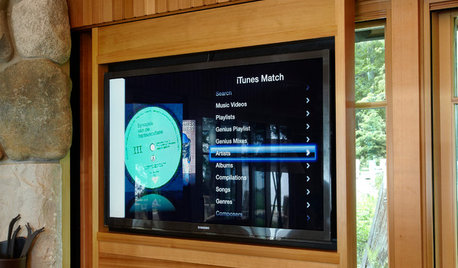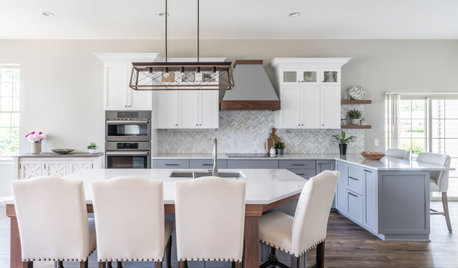Builder fiduciary duty and ethics with allowance
We are building a high end custom home. House is construction loan with high base price and allowances. Contract does not specify which contractors we use, but we have been using builders. Builder mistakenly forwards me an email responding to subcontractors quote for us. Builder asks "is my cut in quote". Subcontractor proceeds to specify how much he can give him, but if the builder wants more he can make bill anything builder wants. How is this ethical???? Is this even legal. I don't care if it happens all the time, is it legal? I feel like he is double dipping and he has an obligation to act in our best interest as fiduciary. This has caused great mistrust and I want to find out his cut on all allowances. How do we know he hasn't reached in our pocket and taken half of each of our allowances (or all of it)? Seems really shady to me.
Comments (43)
millworkman
9 years agolast modified: 9 years agoYour going to get a variety of answers here and some very well may disagree with me, but if the "builder" is paying the subs (meaning he is billing you) then yes it is legal and very common for him to make money. If he is the GC and he is responsible for setting up, overseeing scheduling (ie: assuming responsibility for), then why wouldn't he be expected to make money on the sub (as time is money). Now some builders will put it all out there and others won't, but you also have not explained your contract with the GC and who pays who?
Roberto801
Original Author9 years agolast modified: 9 years agoOf course, I think he should make money. The subs were built into base of contract. I am speaking of decorative items, where we also pay for the installation directly to provider. He is not installing them. If the lighting company brings a broken chandelier, builder not on hook. Lighting company is. If it's so on the up and up, why is it hidden? If allowance is 10,000, how do we know he hasn't put $5,000 back in his pocket? Also, he has not given us one change order, even the contract says he should. Things we thought were included, he is giving us a ridiculous bill now that the house is weeks from complete. I think we will be contacting every subcontractor asking, deposing to subpoenaing them for information on his "kickback".
Related Professionals
West Jordan Architects & Building Designers · Bell Gardens Architects & Building Designers · Beavercreek Home Builders · Lake Worth Home Builders · Cibolo General Contractors · The Crossings General Contractors · Annandale General Contractors · Athens General Contractors · Bremerton General Contractors · Brighton General Contractors · Browns Mills General Contractors · Fredonia General Contractors · Newburgh General Contractors · Sun Prairie General Contractors · Troutdale General Contractorsdej142
9 years agolast modified: 9 years agoI'm new to this process, but this sounds shady to me. The contractor should make money off his contractually negotiated fee, not kickbacks. The part that seems especially unethical is that the sub explicitly states he's willing to charge you more to get the builder more if that's what the builder wants. If the sub were simply sharing with the builder a portion of the profit that he routinely makes off a job, that'd be no detriment to you--the kickback would be out of the sub's pocket. But here, the builder and sub are colluding to exploit you.
To answer your question specifically, I'm not sure if there's a fiduciary duty (that probably depends on the wording of your contract, the state you're in, etc. and it seems like there's a lot of litigation over whether that duty exists), but even if there's not, there's usually an implied duty of good faith and fair dealing that seems to be breached here. And because you have those emails, a litigator would have a lot to work with here.
bry911
9 years agolast modified: 9 years agoGenerally speaking, there are three types of contracts, turn-key, cost plus and flat fee. Each of these will to some extent change the answer but all will generally allow a builder to make money off of subs. Contrary to what you said, the builder is absolutely on the hook for the work the subs do. Including the lighting company who comes to install the lights. In most cases he will be a party to any lawsuit over the construction of the home.
If he gives you an allowance that in no way even implies what he pays for the items and subs. He has access to certain discounts that you may not and he has full right to pay a different amount than the allowance. In fact, in turn-key it is usually like that. The allowance is based off of retail and he gets billed wholesale. Cost plus is the most limiting on the extra amount he can charge, and flat fee you have to really read the contract.
My question to you is this: if you had never found out about this would you still be as upset about other things? I don't think deposing the subs is going to get you anywhere, other than a nice bill from your attorney. In the end, this is pretty standard industry practice, which is going to defeat most of your claim above. Generally, you have to prove that his product was not up to industry standards, his practices were not acceptable in the industry, or that committed a crime. Not having a change order is much more actionable but again he has some small protection with industry standards, now, the bill for the change orders that you did not approve is another thing altogether.
Mistman
9 years agolast modified: 9 years agoI was presented a large bill for overages after our build was completed. I sat down w/the builder and scratched out every item I didn't sign off on and told him that's what I would pay. He asked 'how is that fair?', my response was that I would only pay for overages I was informed about, agreed to and signed off. I know a lot of the charges were legit as we were aware of some of issues he ran into. We also knew some weren't as he was charging for redoing things that had been screwed up by the subs. I think he realized in light of his "sketchy" accounting that he should just take what we agreed to and move on.
Zoe52
9 years agolast modified: 9 years agoI have absolutely no problem with my contactor making more money to oversee his subs. But what I do have a problem with is some of his accounting. He tends to not look at what was on order sheets that he said he would be picking up. He not only double charged us on a wet bar we had paid for earlier, but also charged us for a number of items that supposedly come with his design. He gets angry when we challenge some of our prices because he doesnt itemize anything. Just gives us a bill! After catching some rather large errors we now know why we need to challenge him.
The biggest thing that is bugging me is that he changed some of our design without any change orders. But whenever we change something we have to sign off and pay extra. He decided to omit two exterior chimneys by asking us if we wanted the boxes built into the home or outside. What he didn't say was that if we built them into the home to better aline with our cabinetry next to them that we would be not getting our exterior chimneys. That is a failure of admission in law. And those were two large chimneys that had to be worth thousands of dollars. We actually paid him extra for the stonework on the interior due to the box being installed inside. But would like to know where and when we will be compensated on the exterior chimneys. Right now we have two ugly stainless steel vents sticking out the side of our brick because we have vented gas inserts!
In addition to that he decided not to install several fake vents and a number of shutters that were on our signed off plan. Those all had to be costed in to our basic price so we will be looking for compensation on those items at the end of our build.
There were other changes he made that we found out about later that actually were for the better. However, I still have a problem with someone who decides to change anything on a plan without a change order or discussing what he thinks he should do ahead of time to get our approval.
And FYI, when you order something say at a plumbing company and or electrical place, you may be given one price for them, but some builders often get a kick back on the items when they pick them up. They have a lower price than a typical consumer. So some builders will often pocket the extra money on items that you already paid for when they get their contractor price. Not all builders do this but it does happen.
User
9 years agolast modified: 9 years agoThe GC is not your fiduciary. A fiduciary would have a legal duty to act solely in your interests and if this person is a general contractor he would have an arms-length contract to build you house under specific terms.
In a Cost of the work contract all items are effectively Allowances. In a Lump Sum or Guaranteed Maximum Price contract, Allowances are usually treated like small Cost of the Work contracts and the final price to you would be settled with a Change Order. So, in either case, the builder would ask for subcontractor bids and allow you to participate in the final bidder selection and then he would add his markup to the sub's price as stipulated in your contract. The written proposal would identify these amounts clearly. There should no other compensation for the GC and certainly none from the sub.
If the sub pays the GC directly without your knowledge, that is a kickback which at best is a breach of the construction contract and at worst fraud. If he sends the bill by mail it can be considered mail fraud but I wouldn't count on a Federal prosecutor caring enough to deal with it but a state Attorney General might if this has been going on for a long time.
However, no one can know if your contractor is acting properly since we have no specific information about your contract like how Allowances are billed to you. You should review this matter with an attorney before taking any action.
User
9 years agolast modified: 9 years agoYour builder earns a markup on all materials and labor for everything that goes into the project. Everything. Allowances are just place holders. Guesses. If you have a 10K lighting allowance and you manage to pick everything within that allowance at his supplier, it automatically has his cut figured in. However, if you go over, and spend 15K there, the additional 5K will need to have his 20% markup factored in. If you buy a 5K light fixture for a dining room, he should receive his 20% of that light fixture as compensation for taking responsibility to ensure that the electrician hangs it correctly and it doesn't get broken. You want to add under cabinet lighting that wasn't in the original electrical quote? The labor and the materials for that will get a builder's markup. This is standard building practice.
User
9 years agolast modified: 9 years agoThere seems to be a misunderstanding about what "Cost Plus" means. The actual name of such a contract is "Cost of the Work Plus a Fixed Fee". The Cost of the Work is defined as what the GC ACTUALLY pays for labor and materials to which he adds a predetermined Fee that can be a percentage of the Cost or some other way of determining the GC's compensation.
An Allowance, by definition, has an estimate rather than a fixed cost and the final contract amount must therefore always be determined by a Change Order. That means the Cost charged cannot exceed the ACTUAL amounts paid for the materials including discounts (Labor and installation costs should be avoided in an Allowance).
The GC's only compensation is from the "Fixed Fee" not a a sub's hidden mark-up, kickback or discount.
jammu2
9 years agolast modified: 9 years agoAllowances are the devil.
I knew that and tried to negotiate with our architect that he would have everything specified in the plans, but he ended up being somewhat a cad and after he billed up to his cap he lost interest in us.
So we ended up going out to bid with 6 or 7 allowance items.
I didn't care too much when one came in a hundred over, another $500 over. We went to do floors. I asked the rep 4 times during the selection process how we were doing on budget. "Looks good" was always the reply.
Well, in the end it was over $10,000 over. I was discussing this with our builder and I just mentioned something to the effect "Do you think if I showed up at ABC Floors with $40,000 they could work up a reasonable floor package for me?"
Next thing you know, after the tile on 120 square feet was changed and the carpeting in the exercise room was changed, the price was $9,300 less. WTF? I suppose if I had just accepted the overage (we worked so hard to get just the right selections!!) I would be out 10K and those two would be 10K richer. As it is, they are doing fine without the extra 10K.
As a professional in a different highly regulated industry I am just flabbergasted how this all works. I will never do it again.
You have to look at the whole package, not the sum of the parts. To that end I believe we are getting, overall, a "fair" deal. But you have to watch every single thing.
Good luck!
amberm145_gw
9 years agolast modified: 9 years agoAs you've described the exchange above, I see nothing wrong with it. The sub says the builder's price is $X, but he's accounted for the Y% that the builder adds on. Whatever Y is depends either on the contracted agreement with you (cost plus), or the builder's own projected mark up (flat fee). Since the sub doesn't know what Y is for this job, he's asking if he needs to increase it.
I would be concerned about this if the builder was increasing it, and adding on more than you agreed to. Either he's told you that he's getting you his discounted prices, but you're actually getting retail and he's pocketing the discount. That would be unethical. Or if you have an agreement for his cost plus 10%, but he's asking the supplier to put on a 10% increase that he's THEN going to add his 10% when he passes the bill on to you.
But from what you've said, it was the sub offering to increase it, not the builder. So I see no reason to be upset with the builder. The builder asking "does this include my cut?" is a crude equivalent of saying "is this the retail price, or is this my discounted price?"
Roberto801
Original Author9 years agolast modified: 9 years agoOk. So lets say I added a living room to the plans. Builder quotes me, $30,000, but then gives $5,000 allowance for built ins and lights. Why should he get kick back on the $5,000 allowance (especially without disclosing it). He should make the profit in the $30,000 agreed upon amount. There was no agreement he would get portion of allowance. I do not have to use his subcontractors per the agreement. If he is going to take part of my allowance shouldn't there be disclosure? Shouldn't the allowance be treated as cash? What if he marks it up 50%-100%. If he does this, I really never had an allowance at all. We asked for prices for dimmers and motion sensor lights. He marked that up over 100%. Electrical may be treated differently? We don't have an allowance for electrical.
Roberto801
Original Author9 years agolast modified: 9 years agoThis has me questioning all the allowances and bids he has given us. Everyone of them has been grossly over allowance. He is making a fortune off us. Never once a change order. Spent $47,000 on cabinets, would have thought that would have included installation, then we get a bill for an extra $3500. Why don't builders just tell the truth? If we were told there would be percent added on to allowances--we probably wouldn't have had a problem with it. Now we don't trust a thing about this builder, nor would we refer him to anyone.
amberm145_gw
9 years agolast modified: 9 years agoIt sounds like he hasn't been completely up front about everything. But he's not necessarily being unethical.
So, you've got a $5000 "allowance" for lighting. All this means is that when he said the job was going to cost $30k, he was assuming that $5k of that would be spent on lights. If you bring your lights from somewhere else, you only pay him $25k. If you go and spend $10k on lights, the job will cost $35k.
Now, if you're going to his lighting store and pick out $1k worth of lights, but the salesman writes up the bill for $5k because the builder is getting whatever you don't spend out of the $5k, then that would be sketchy and possibly illegal.
But I highly doubt that's happening. If it were, then you'd be able to go to any lighting store, even the builder's preferred one, and get the exact same fixtures for $1k instead of $5k just by not mentioning the builder's name. What I suspect is happening is that if you went into the lighting store, you'd pick out those lights, and your price would be $2k. But because the builder buys lights from that store so often, he gets a preferred customer discount. If you put the lights on his account, they're only $1k. And maybe instead of giving them to you for $1k, he's charging you any markup he feels like. Really, as long as it's no more than the price you would have paid on your own, what difference does it make? Does it really matter to you whether the lighting store or the builder makes the extra profit?
I suppose it seems shady because you assume he's making a certain amount for the build, but you really don't know how many bonuses he's getting every time you use one of his suppliers.
But given that you're not obligate to use his vendors, I doubt he's getting all that much back from them. Because then you wouldn't be using them.
And yes, he probably is making what seems to be a fortune off your build. It's his business. His livelihood. He's got years of experience that you are relying on, and possibly even staff to pay. Being a custom home builder isn't charity work.
MFatt16
9 years agolast modified: 9 years agoAllowances are always a little padded, they include your total cost for the item (product/labor/mark-up) They do not represent the actual amount your builder pays, just what you are paying. In my experience anyways.
dej142
9 years agolast modified: 9 years agoI'm wondering how to draft around this issue (and also whether Roberto801 can do a contract amendment to address this issue on a forward-going basis). Would something like this work (assuming this is fixed price contract):
Contractor agrees to use reasonable efforts to obtain all "builder's discounts" and other rebates and benefits typically available to builders from the suppliers and subs providing items or services under the Allowances section. Contractor agrees that all such discounts, rebates or similar benefits are for Owner's benefit. In billing items under the Allowances section, Contractor will bill, and Owner will pay, the actual cost of such Allowance items (taking into account all such discounts, rebates or similar benefits), plus a Contractor's markup of __%. All purchases and costs related to Allowance items shall be documented by written change orders signed by both Contractor and Owner using the change order process described in Section __.
Would that help to make things more transparent? Would a builder go for this?
MFatt16
9 years agolast modified: 9 years agoAll builder's are different on what they are willing to deal with. The most trasparent contracts are fully specified. Hard to do in my opinion. Or a cost plus type contract where you are given reciepts to show expenses and the GC charges X% on top of cost.
Roberto801
Original Author9 years agolast modified: 9 years agoSaying building is "not charity work", is insulting. I suspect you are a builder or subcontractor and would have your mind made up--regardless of what I said. I know it is not charity work. I don't expect it to be. Why isn't mark up transparent? If he is only getting part of discount maybe it is not a big deal? Maybe it is? Once again, for example if I am quoted $38,000 for room, $10,000 of that $38,000 for allowance to pick out custom things at a store. If I don't use entire allowance it's supposed to come off the bottom line price. Why should store send him bill and he have the ability to mark it up for whatever he wants without us seeing what goes where? How is that ethical? Contract does not say he is allowed to do it.
robin0919
9 years agolast modified: 9 years agoReno....you said that a 'cost of the work plus a fixed fee' but then you said the GC has the right to markup again for each thing a sub does? That doesn't make any sense. I know a couple of GC's in this area that charge a 'flat' fee to build a house. The consumer pays the actual GC price for 'everything', NO markup.
dej142
9 years agolast modified: 9 years agosorry, duplicate post
This post was edited by dej142 on Mon, Jan 19, 15 at 20:41
jammu2
9 years agolast modified: 9 years agoThe problem is the prices are not the prices.
For example, the allowance items. You go to the showroom and pick out tile. The builder typically gets a 25% discount. Does your builder pass that discount on to you? How do you know?
Same with plumbing. You sit there with a person and he or she shows you a faucet with a "retail" price of 200. They say their price is 130. The online price is 99. There's a lot of play in there. If your plumbing allowance is 4000 and they write it all up at their displayed "discounted" prices, you are basically getting $3000 worth of plumbing and paying $4000 for it. Who gets the $1000 I think that is the issue.
Interesting discussion. Imo it's all in the contract somewhere. If you have a two page contract like one builder tried to get us to sign you are pretty much screwed.
User
9 years agolast modified: 9 years agoRobin, I described the GC's Fee as "a predetermined Fee that can be a percentage of the Cost or some other way of determining the GC's compensation"
For instance, in AIA A107, the instructions for entering the Contractor's Fee is: "State a lump sum, percentage of Cost of the Work or other provision for determining the Contractor's Fee and the method of adjustment to the Fee for changes in the Work."
In the case you mention, the GC has elected to receive his compensation as a Lump Sum instead of a mark-up of the Cost of the Work.
A107 also includes a section for Allowances:
"The Contractor shall include in the contract Sum all allowances stated in the Contract Documents. the Owner shall select materials and equipment under allowances with reasonable promptness. Allowance amounts shall include the cost to the Contractor of materials and equipment delivered to the site and all required taxes, less applicable trade discounts. Allowance amounts shall not include the Contractor's costs for unloading at the site, labor, installation, overhead, and profit."Since the final price of an Allowance is unlikely to be the same as the original Allowance amount, that price will normally represent a change in the contract amount or possibly the Fee which would require a Change Order.
One of the difficulties you will find in learning how construction contracts work is that most home builders write their own short form contracts and only include the terms, conditions and definitions they like. A Standard Form AIA contract allows a great deal of modification and can therefore cover multiple possibilities in the text as explained in the separate instructions. I am not recommending the use of AIA documents but regardless of your experience you should use them as guides.
Here is a link that might be useful: sample AIA Owner-Contractor contract form for a project of limited scope
User
9 years agolast modified: 9 years agojammu2, don't confuse supplier and sub contractor OH&P markup with a GC's OH&P markup. The former is controlled by competitive bidding (or shopping) and the latter is controlled by the contract.
Trouble arises when the GC does not allow competitive supplier/sub-contractor bidding or owner shopping and if he takes additional compensation from the suppliers/sub-contractors in addition to what the contract says he is due from the Owner. A GC's markup is in this bill to the Owner not hidden in the supplier/sub-contractor price.
But it is impossible to be specific about this GC's actions regarding ethics or fraud because we don't know what the OP's contract says about GC compensation and allowances.
galore2112
9 years agolast modified: 9 years agoIn my experience the construction business is full of rip off artists. Especially if you build a custom home, where you are viewed as a cash cow.
You build a $700k+ home, so what's an additional $10k here or there?!
This is also evident in this thread with lots of understanding for the builder...
Nothing in this business is priced absolutely. When I built I got quotes that varied up to 500% between cheapest to most expensive for the exact same job. Some contractors immediately assume that you are well off and ready to be charged an arm and a leg.
It doesn't help that some customers are too timid to question a bid because they think this makes them appear cheap or tacky.
Because of this prevailing attitude I'm not surprised that the sub colluded with your builder to charge you as much as possible. It's probably a legal grey area. I would talk to the builder and let him know that this severely damaged your trust and that you expect transparency for allowances going forward. I'd also research prices for allowance items and challenge every suspicious charge. He needs to know that he can't just rip you like that.
amberm145_gw
9 years agolast modified: 9 years agoRoberto, is that the only part of my post that you read? I am a homeowner. But I like to think I am a fair and reasonable one.
I agreed that he's making it seem worse than it is by not being transparent.
Do you know for a fact that you're buying less than your allowance, and your builder is having the supplier mark up the prices so he gets whatever you don't spend at the lighting store? Because again, yes, that would be possibly illegal.
If you suspect that is happening, then don't go through his suppliers. Or go back to his supplier (or have a friend do it) and price out the same materials again without using his name. You should be getting the same price or more than what you're paying through him, with his markup.
I guess what you're feeling is that if you pick out something from his supplier and his price is $1k, and your allowance is $2k, you should get $1k off the project, because you came in under the allowance. Right?
Except that, "his" price is "his" price based on the relationship he's cultivated with that supplier. If you didn't use his discount, YOUR price would have been higher. So as long as "his" price + his markup is no more than your price, what does it matter to you? Sure, he's getting a little extra. But if he wasn't, then the supplier would have gotten it. Instead of the supplier keeping it, they are giving him a commission for sending business their way.
Should he pass that commission back to you? Some do. Some don't. Some count on that bonus, and charge less for their fees knowing that they'll make it up on their kick backs from suppliers. The ones who are completely transparent and take no kick backs charge more up front. Or maybe they charge less up front, and are transparent about taking a cut from the suppliers. Those ones generally insist you use their suppliers, since they are counting on the markup to make up their fees. It's different pricing models.
In the airline industry, some tickets are cheaper up front, but then you pay extra for your luggage and seat selection. Other tickets are more expensive, but you get free luggage and booze. Either way, as long as they aren't tricking you into paying more, then it's all perfectly legal.
My plumber priced his job based on me providing all the fixtures. For a large number of them, I went to a place who happened to be one of his suppliers. When they realized they knew my plumber, they asked him if I was allowed to use his discount. He never returned their call, and I had to pay retail. But it was less than other suppliers' retail price, so I paid it. His discount price allows him to put in his markup when he resells those pieces to customers. Since he wasn't reselling it, he didn't see any reason to let me use the discount, and essentially pay less than his other customers. So the store got more. If I had told him to go buy it for me, the store would have gotten less, and he would have made a little extra. Was he being a jerk by not letting me have his pricing? Yeah, probably, but that's my plumber for you. Would I have been angry if he'd have let me use the discount and then asked me to give him some of the difference? No, because I would have saved money by using his name, so I'd have been happy to share that with him. It's all perfectly legit and transparent, but I'm probably paying more in the end than if I'd let him go buy the toilets for me. (Since I'm paying him based on him not getting to add his markup, AND I'm paying retail to the supplier.)
amberm145_gw
9 years agolast modified: 9 years agoI'd also research prices for allowance items and challenge every suspicious charge. He needs to know that he can't just rip you like that.
I agree with you 100%, jrldh. But given that OP is just using the builder's suppliers, there is a bit of a convenience charge here. He might pay less by shopping around and getting better prices elsewhere. But that would require effort on his own part.
The reason people who can afford more end up paying more is that most often, they just don't have the time or inclination to research and find less expensive options. If it's going to take 20 hours to find a solution that saves $2000, and I make $100/hour, then it's not a cost savings to me. But if I only make $10/hour, then I would absolutely put 20 hours into saving $2000. And yes, some people will assume that because you can afford a big new house, you aren't going to have the time to shop around, so go ahead and give me your wildest number.
And I guess that's where the fiduciary duty question comes in. If you're paying someone to make a decision for you because you don't have the time or expertise to be able to decide for yourself, then that person is your agent, and has a fiduciary duty.
But in this case, because the OP is free to shop around, the builder is not making the decision, and is not his agent, and therefore doesn't have a fiduciary duty.
Roberto801
Original Author9 years agolast modified: 9 years agoI think this matter basically comes down to trust and transparency. Whether he is entitled to a part of the discount or not, if he had been open and honest about it, it probably would not have been an issue. When you jack up a suppliers bill, and an owner finds out about it only because you mistakenly send them an email--its a problem. It may even be fraud. People are leary about building to begin with. They have fear of being ripped off. If you lose your reputation, you will eventually lose your business. I think builders need to think about that, they can even use it as a marketing tool. Pure transparency!
User
9 years agolast modified: 9 years agoThe discussion has become pointless. Without seeing the contract clauses for Price limits, Allowances and GC compensation there is no way to know if the sweetheart/kickback deal was a breach of contract or not.
It is difficult to think of how or why an owner would allow such an arrangement in a contract and I have never seen it done but why talk about something we know nothing about?
If the OP wants to get a definitive answer to his question he will post the contract terms. Until then we can only speculate.
But I can tell the OP one thing for certain: if the GC reduced his prices as a result of the email mistake then he should also refund all that he took from you with any earlier fraudulent allowance billing. And it should all be done with a written Change Order.
This post was edited by Renovator8 on Tue, Jan 20, 15 at 18:46
bry911
9 years agolast modified: 9 years agoI wanted to clarify what I meant by allowances in no way indicate what the GC is paying.
The accounting for the construction business is not really that hard but it is also not exactly transparent.
There was a time before internet shopping that almost all supply houses and some subcontractors had different prices for retail and contractors. Today many supply houses give the contractor price to everyone. So in essence you get what the contractor pays. Right? Well no.
First off, contractors often have credit terms like 2/10 net 30 so can get a 2% discount for prompt payment. Additionally, contractors can have trade discounts. In essence a trade discount says you are such a good customer that you only pay 92% of the bill.
In this case, if a supplier bills a contractor $1,000 the contractor may only pay $901.60 even though the bill indicated he owed $1,000. This is not unusual accounting and is the standard in a lot of industries but it is largely hidden from the end user.
Lets look at an example assuming you pay the GC and he pays the subs, If you have a $10,000 allowance for fixtures, but only select $8,000 of fixtures, you have a $2,000 refund due. But that does not mean the amount the contractor paid was $8,000 he can take advantage of trade and purchase discounts to reduce the money he pays, sometimes by as much as 10 - 20 percent.
In the end you are still better off as you still have access to a better price than you would have gotten. He makes some money on the supplier and gets the advantage of a good relationship with the supplier and the supplier gets the business. Everyone wins, or so it is supposed to be.
User
9 years agolast modified: 9 years agoI realize that many homebuilders write their own contracts and might fail to clarify important issues like what an Allowance is and how the final price of it will be determined including how discounts and changes in the GC's compensation will be calculated. I suspect the absence of these contract provisions is often intentional so it is up to the Owner to negotiate acceptable Allowance provisions.
In standardized professionally written and published construction contracts the cost for the final buyout of an Allowance is in the form of a written Change Proposal and if accepted by the Owner, the amount would later be included in a Change Order that would modify the contract price (if the price was limited) with copies of all payment receipts attached showing what the GC actually paid minus any discounts.
Even WIKIPEDIA acknowledges this definition of an Allowance:
Quote
"In construction, an allowance is an amount specified and included in the construction contract (or specifications) for a certain item of work (e.g., appliances, lighting, etc.) whose details are not yet determined at the time of contracting. Typically:1. the allowance amount covers the cost of the contractor's material/equipment delivered to the project plus all taxes less any trade discounts to which the contractor may be entitled with respect to the item of work;
2. the contractor's costs for labor (installation), overhead, profit and other expenses with respect to the allowance item are included in the base contract amount but not in the allowance amount;
3. if the section 1 costs for the item of work are higher (or lower) than the allowance amount, the base contract amount should be increased (decreased) by the difference in the two amounts and by the change (if any) to the contractor's costs under section 2.The allowance provisions may be handled otherwise in the contract: e.g., the flooring allowance may state that installation costs are part of the allowance. The contractor may be required to produce records of the original takeoff or estimate of the section 2 costs for each allowance item.
Other issues that should be considered in the contract's allowance provision are:
- may the client insist that the contractor use whomever the client wishes to do the allowance work?;
- may the contractor charge the client back for any costs arising from a delay by the client (or client's agent) in selecting the material or equipment of the allowance in question?" End of QuoteWhatever the terms of the contract it should be clear that if a General Contractor accepted kickbacks or discounts directly or indirectly from a sub or supplier and included those amounts in the Allowance buyout proposal to the Owner, the Owner would be unknowingly paying the builder twice for the same service.
Not only should an Owner insist that the terms of Allowances be clearly stated in the contract, it is wise for the Owner to do some preliminary cost research with the help of their designer and adjust the Allowance amounts accordingly and to limit Allowances to materials only; all labor and installation costs should be included in the contract price. Estimated quantities and/or Unit Prices should also be included in the contract.
Two entities must agree to a construction contract so, by definition, it is a negotiation. If a contractor is not willing to clarify important issues or include protections for you, you should move on to another contractor while you still can. There are usually plenty of good ones available but you have to make the effort to find them.
For me its simple; I include AIA A107 modified as needed for the project in the bid documents. I've had many contractors ask me how they can get copies of this contract. Anything that simplifies the bidding process or can reduce the chance of Owner-Contractor disputes should be of interest to all participants.
joshua1
4 years agoSurprise your builder! ask to see the canceled checks he gave to his subcontractors for the work they did. If it’s less than the builder represented to you. KICKBACK!!
Example:
Step 1. Builder asks kitchen company/subcontractor for allowance/estimate on kitchen.
Step 2. Kitchen company/Subcontractor gives allowance to builder let’s say $100k.
At this point the the builder will say “ add 15% on for me ($15k)
Step 3. The subcontractor writes a contract for $115k. (Of course the builder highly recommends this kitchen company to the homeowner).
Step 4. The work is completed. The builder requests payment. The homeowner pays the builder. The $115k plus the contracted markup. Usually 15% in my area. Then pays the kitchen company $100k.
So this kitchen that should have cost the homeowner $100k + the “contracted” fee of 15% ( $115k ) now cost the homeowner $132k and builder only paid $100k for it. That’s a 32% markup when he contracted 15%. THATS A KICKBACK. builders bid low just to get that profit machine started. They try cultivate a complete crew of subcontractors that will do this for them. It more than doubles their profit margin. They just have to manage a stressed out homeowner that can’t understand why costs are out of control.Virgil Carter Fine Art
4 years agoMy earlier comments seem to have disappeared.
FWIW, general contractors and subcontractors have no fiduciary responsibility to an owner. Their challenge is to stay in business and that's their first and only responsibility.
An architect, commissioned by an owner, has fiduciary responsibility to the owner.Virgil Carter Fine Art
4 years agoYep, I know. The subject is important enough to add correct information.
bry911
4 years agolast modified: 4 years agoWIW, general contractors and subcontractors have no fiduciary responsibility to an owner. Their challenge is to stay in business and that's their first and only responsibility.
An architect, commissioned by an owner, has fiduciary responsibility to the owner.Architects are not typically fiduciaries. This was something I was surprised by and looked into years ago, and I looked into it again last night. I looked at several cases and a summary consensus is that architects do not owe a fiduciary duty by law. They mostly use a typical "standard of care" model, however, inherent in that standard of care model are certain fiduciary duties.
A fiduciary duty is different than a fiduciary. A fiduciary duty can be created by contract or law even with people who are not fiduciaries. Any type of cost plus arrangement creates certain fiduciary responsibilities on a contractor and possibly a subcontractor. They are fairly limited when compared to that of an architect, where the duties are created in the standard of care, but they do still exist. However, an architect's fiduciary duty is limited when compared with a full agency created fiduciary responsibility.
A good example of this is the recent thread about an architect refusing to make client desired changes. If you can maintain that type of control over the work, you are probably not a fiduciary. A fiduciary must act as an agent for the client, doing what is in the best interest of the client regardless of personal preference.
To some extent the effectiveness of a fiduciary duty is defined by the licensing board and the disciplinary actions it will take. Even a legal fiduciary with agency does little unless the licensing authority enforces it.
For example, I know a young CPA who lost his license permanently for saying one sentence at a party that went something like, "I have been at X corporation all week long, man that company is a mess," and another whose license was suspended for not revealing his wife catered a few events at a law firm he recommended (his wife was a caterer with at least a hundred repeat clients).
ETA: I really don't want to have a big discussion about this or anything, but do want to note that just because a the relationship is arm's length, doesn't mean there are no fiduciary responsibilities.
ETA2: I don't see how anyone can claim an agency relationship by creating copyrighted material to which they maintain the copyright. The two things are diametrically opposed.
bry911
4 years agoAgain, a fiduciary duty does not a fiduciary make.
From your own post...
Sala Architects was hired to design a single family home and the trial judge found a breach of a fiduciary duty. The appellate court did not agree that the architect was a fiduciary,as a matter of law, and it reversed on that point.
This goes to my point, an architect need not be a fiduciary to have a fiduciary duty. Typically architects are forbidden from taking kickback type arrangements. That creates a fiduciary duty in that area, but doesn't make them fiduciaries as a matter of law.
Here is another from your own source...
The court characterized the architect's duty as a breach of contract/professional negligence one, "which the plaintiff is attempting to enlarge into a case involving fiduciary duties without the requisite loyalty and trust that such a relationship requires."
And another...
Although the architect's duties were extensive, the trial court did not find the architect's superior knowledge sufficient to give rise to any fiduciary relationship; rather, there was only a business relationship, and not one that involved sufficient loyalty or trust "which characterizes a fiduciary relationship."
And another...
The Nebraska Supreme Court ruled that the cross-suit against the architect for breach of fiduciary duty was unfounded because the relationship was governed by the architectural services contract which incorporated the architect's professional standard of care.
And another...
Plaintiff alleged the architect had a duty to investigate and warn the client of potential waste disposal problems given the architect's alleged status as fiduciary; however, the Court found that the architect's duties were based upon its contract with the owner. In that regard, the court found the architect had a duty to "exercise professional skill and reasonable care in preparing plans and specifications according to its contract." This was so even though the architect "professed to be a specialist in designs for the dairy industry..."Virgil Carter Fine Art
4 years agoI'm really not interested in debating the question one way or the other. I posted for information, rather than heresay.
The OP's question, in this old thread, was about a general contractor's fudiciary responsibility.
My point was that an architect and a general contractor have differnet responsibilities, especially fudiciary responsibilities.bry911
4 years agoMy point was that an architect and a general contractor have differnet responsibilities, especially fudiciary responsibilities.
There are a few specific fields where principal/agent is established by law, (e.g. CEO's & CPA's). For the rest, principal/agent vs. principal/contractor is determined by the contract. A contract can also create fiduciary duties in a non-fiduciary relationship. This might make the contractor a fiduciary, or just assign certain fiduciary duties. Furthermore, the law creates certain fiduciary duties or quasi-fiduciary duties even when they are not created by the contract, these typically involve costs or fees.
A cost plus contract is a fiduciary account. Allowances that are cost plus in a fixed price contract will also be fiduciary accounts. So for the purposes of kickbacks in a cost plus relationship, the difference in duties between a contractor and an architect are small. For disclosures of conflict of interest they are very different. So to say one has a responsibility and one doesn't may be true, or may be false.Virgil Carter Fine Art
4 years agoI agree that the contract is a key element in determining fiduciary duties or not.
If I Renner correctly, standard AIA Owner-Architect agreements used to include fiduciary responsibilities. That may have changed in current versions.
I have never heard that cost plus contract and allowances in a fixed price contract carry fiduciary responsibilities.bry911
4 years agolast modified: 4 years agostandard AIA Owner-Architect agreements used to include fiduciary responsibilities. That may have changed in current versions.
AIA document B101 mentions "standard of care" 36 times and "fiduciary" 0 times. For the last 12 years there has not been a mention of fiduciary that I can find.
I have never heard that cost plus contract and allowances in a fixed price contract carry fiduciary responsibilities.
A fiduciary relationship is one that creates a principal/agent relationship. Broadly this means that you are acting on behalf of the other person. Employees are agents of their employer when carrying out the duties of their job. That is why employees are sometimes protected from legal recourse and employers are responsible for damages caused by their employees.
This goes to the very heart of the relationship, an agent can financially or otherwise bind the principal. The ultimate example of the principal/agent relationship is a general power of attorney, which can give you authority over finances as well as health and well being.
Almost any time there is a reimbursement type account, there is going to be some fiduciary responsibility attached to that. In essence, a cost plus contract is a reimbursement account with a fee added to the top. Since a contractor is acting to legally bind the homeowner for payment, it makes sense that this is a trust account. Which means there is going to be some fiduciary responsibilities attached.
Again, I struggle to reconcile the idea that an architect has a principal/agent relationship when the work they produce is copyrighted by them. Which, I suspect, is why the AIA is trying to accomplish many of the same things in a standard of care model. A standard of care model could conceivably be just as constrictive or protective.
Have a great day, I am out for a while.

















Roberto801Original Author